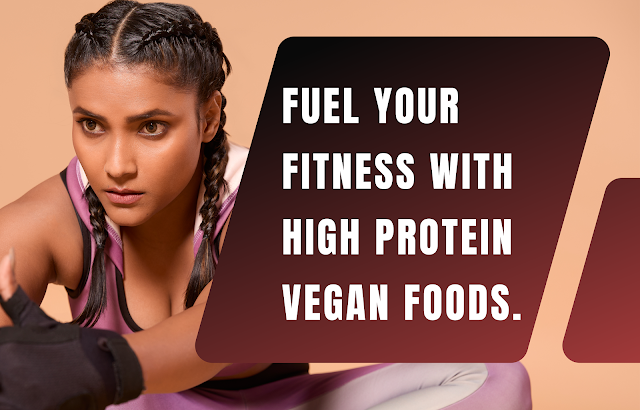In recent years, the popularity of veganism has soared, driven by ethical, environmental, and health concerns. Many individuals are now adopting a vegan lifestyle, even those who are passionate about fitness and muscle building. The common misconception that animal products are necessary for muscle growth is being debunked, as an increasing number of athletes and bodybuilders are achieving impressive results on plant-based diets.
Understanding the Importance of Protein
Protein is an essential macronutrient that plays a crucial role in muscle repair, growth, and maintenance. When we engage in resistance training or intense physical activity, our muscles experience microscopic damage. Protein is responsible for repairing and rebuilding these muscle fibers, making it a fundamental nutrient for muscle growth.
Contrary to popular belief, plant-based sources can provide all the amino acids required for muscle development. By incorporating a variety of high protein vegan foods into your diet, you can meet your protein needs and support muscle growth without relying on animal products.
>>> Omega-3s Without Fish: The Importance of Omega-3s for Vegans and How to Get Them.
High Protein Vegan Foods
1. Legumes and Beans: Legumes such as lentils, chickpeas, black beans, and kidney beans are excellent sources of plant-based protein. They are also rich in fiber, complex carbohydrates, and minerals. Incorporate them into your meals through soups, salads, stews, or by making delicious bean-based burgers.
2. Tofu and Tempeh: Made from soybeans, tofu, and tempeh are versatile plant-based protein options. They are low in saturated fat and cholesterol-free, making them heart-healthy choices. Experiment with different marinades and cooking methods to enhance their flavors and incorporate them into stir-fries, sandwiches, or as a replacement for meat in various dishes.
3. Quinoa: Quinoa is a complete protein, containing all the essential amino acids your body needs. It is also gluten-free and rich in fiber, making it an excellent option for those with dietary restrictions or sensitivities. Use quinoa as a base for salads, stir-fries, or as a side dish to boost your protein intake.
4. Nuts and Seeds: Almonds, peanuts, cashews, chia seeds, hemp seeds, and flaxseeds are all great sources of protein, healthy fats, and other essential nutrients. Snack on these or incorporate them into your meals by sprinkling them over salads, adding them to smoothies, or using them as a topping for plant-based yogurt or oatmeal.
>>> Vegan Protein Smoothie Recipes.
5. Seitan: Seitan, also known as wheat gluten, is a high protein food commonly used as a meat substitute. It has a texture similar to meat and is an excellent option for those looking for a more familiar taste and texture. You can find seitan in various forms, including deli slices, sausages, and ground meat alternatives.
Balancing Macronutrients
While focusing on high protein vegan foods is crucial, it's also important to maintain a balanced macronutrient intake. Carbohydrates provide the energy necessary for intense workouts, while healthy fats support overall health and hormone production. Incorporate whole grains, fruits, vegetables, and plant-based fats like avocados, olive oil, and coconut oil into your diet to ensure you are meeting all your nutrient requirements.
Meal Planning for Muscle Growth
To maximize muscle growth on a vegan diet, consider the following meal planning tips:
1. Prioritize Protein: Aim to include a good source of protein with each meal. For example, incorporate tofu or legumes in your lunch and dinner, and add seeds or nuts to your breakfast or snacks.
2. Pre-Workout Nutrition: Consume a protein-rich snack or meal within an hour before and after your workout to provide your muscles with the necessary building blocks for recovery and growth. This could be a protein shake made with plant-based protein powder, a tofu and vegetable stir-fry, or a lentil salad.
>>> Vegan Recipes For Beginners And How To Make The Transition To A Plant-Based Lifestyle.
3. Optimize Nutrient Timing: Distribute your protein intake evenly throughout the day to maintain a steady supply of amino acids for muscle repair and growth. Aim to have three to four protein-rich meals or snacks spaced out across your day.
4. Incorporate Variety: To ensure you're getting a wide range of nutrients, include a diverse array of high protein vegan foods in your diet. Experiment with different recipes, flavors, and cooking methods to keep your meals exciting and enjoyable.
5. Stay Hydrated: Hydration is often overlooked but plays a crucial role in overall health and muscle function. Drink an adequate amount of water throughout the day to support optimal performance and recovery.
Supplementation
While it is possible to meet your protein needs through a well-planned vegan diet, some individuals may choose to supplement their intake with vegan protein powders. These powders are typically made from plant-based sources such as peas, brown rice, or hemp. However, it's important to note that supplements should never replace whole foods and should be used as a complement to a balanced diet.
>>> Unleash the Flavor Explosion: Try Our Mouth-Watering Vegan Pesto Lasagna Recipe Now.
Consult a Registered Dietitian
If you're new to veganism or have specific fitness goals, it can be beneficial to consult a registered dietitian with expertise in vegan nutrition. They can help tailor a meal plan specific to your needs, ensure you're meeting all your nutrient requirements, and provide guidance on optimizing your vegan diet for muscle building.
To conclude, building muscle on a vegan diet is entirely achievable by incorporating high protein vegan foods into your meals and snacks. Legumes, tofu, tempeh, quinoa, nuts, seeds, and seitan are just a few examples of the many plant-based protein sources available.
By prioritizing protein intake, balancing macronutrients, optimizing nutrient timing, and staying hydrated, you can fuel your fitness journey and achieve your muscle-building goals while following a vegan lifestyle. Remember, always listen to your body, track your progress, and consult a healthcare professional for personalized advice.
>>> My Vegan Journey: Tips and Tricks for a Sustainable Lifestyle.
>>> Vegan Protein Smoothie Recipes.




.png)











0 Comments